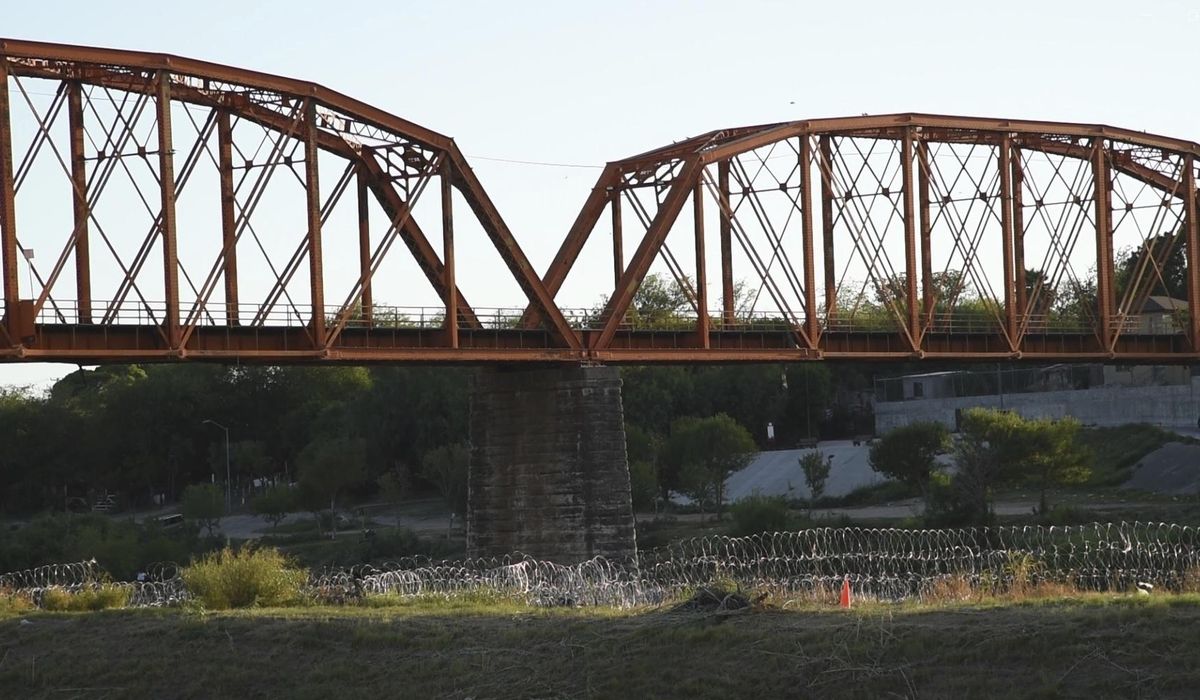McALLEN, Texas — The federal government has closed railroad crossings in two Texas border towns, raising concerns about the potential impact on cross-border trade and American consumers.
Customs and Border Protection announced Sunday that it would temporarily stop railroad operations in Eagle Pass and El Paso starting Monday. It did not say how long rail operations would be paused.
The railroads and politicians have decried the move that closes two of the six available railroad systems between Mexico and the U.S.
“This train doesn’t just stop at Eagle Pass. This train doesn’t just impact Texas,” Rep. Tony Gonzalez, a Republican congressman who represents the affected region, said Tuesday during a news conference. “This train impacts all of America, goods that are going all over America.”
CBP reported as many as 10,000 people entering the country illegally every day through the southwest border this month. Closing the railroad would free up customs officers to assist overwhelmed U.S. Border Patrol agents who need to take migrants into custody.
Thousands of asylum-seekers who have crossed are sleeping outside along the border as they wait for federal agents to process them. Most are released with notices to appear in immigration courts, which are backlogged with more than 3 million cases.
Operations were changed for similar reasons when CBP closed a port of entry in Lukeville, Arizona, a pedestrian crosswalk in San Diego, and an international bridge in Eagle Pass, Texas.
Union Pacific and BNSF are the two railroads directly affected by the rail closures in Texas. Between them, 24 trains typically use the railroads daily to move agricultural products, automotive parts, finished vehicles, chemicals, and other consumer goods, according to the Association of American Railroads.
Union Pacific estimated its losses – in goods, wages and transportation costs – will exceed $200 million a day if the crossings in both cities remain closed. The railroad giant said the two crossings make up 45% of its cross-border business and that it cannot shift trains to other gateways.
BNSF did not provide a dollar estimate of losses but said it anticipates an impact to employees and a significant “downstream effect across our system, since those trains then travel throughout our 32,500-mile network,” according to a statement shared with the Associated Press.
Nearly 10,000 Union Pacific rail cars are currently halted on both sides of the border. Some of those cars contain automotive parts and completed vehicles.
Automakers Ford, GM and Toyota told AP that they would not be immediately affected by the border shutdowns, but Stellantis, an automaker of 14 car brands including Dodge, Jeep, and Chrysler, expressed concern.
“The suspension of rail operations at the international crossings between Texas and Mexico has the potential to significantly impact production at Stellantis’ North American facilities that will quickly ripple out to our U.S. supply base,” spokesperson Jodi Stinson said in a statement.
Union Pacific said it has more than 60 trains – carrying automotive cars, food and beverages, industrial commodities, and agriculture products such as grain – waiting at the border.
The National Grain and Feed Association and the North America Export Grain Association raised fears that stalled grain and oilseed shipments could have an impact for their customers in Mexico, which is among the groups’ most important export markets.
“NGFA and NAEGA have become aware this afternoon of critical tightness in feeding supplies for several livestock feeders in Mexico,” the organizations said in a statement. “We have also learned of grain trains in multiple states being held for shipment due to CBP’s embargo. The critical nature of this issue is growing by the hour, particularly for those livestock feeders that may run short of feed.”
NGFA President Michael Seyfert said livestock feeders in Mexico could start to run out of grain to feed their animals if the crossings don’t reopen within a week because they don’t keep a big supply on hand.
“You can maybe stretch rations for a bit, but you can only do that so long,” he said. “And then it’s not like you shut the factory down for two days. You start making some some real difficult decisions related to animals from a humaneness standpoint.”
Trucks are a potential alternative to trains, although moving goods at such volume via road would be logistically problematic. It would take roughly 550 trucks to deliver the grain that one 110-car train hauls.
Union Pacific said it moves about 450,000 rail shipments through Eagle Pass and El Paso each year and estimates it would take one million trucks to move the same volume, or 2,800 trucks daily.
Migrants often board the trains as they travel through Mexico, but this does not guarantee entry to the U.S.
Union Pacific and BNSF use police, partnerships with federal agencies and technology to deter and detect contraband and people entering the country illegally. Union Pacific has a system that uses gamma-ray imaging to spot unwanted passengers.
Union Pacific said it has found only five migrants trying to enter the U.S. illegally on its trains in the last five weeks.
“Through our efforts, we have experienced very few people attempting to cross the border on trains at both ports of entry,” BNSF said via a statement.
𝗖𝗿𝗲𝗱𝗶𝘁𝘀, 𝗖𝗼𝗽𝘆𝗿𝗶𝗴𝗵𝘁 & 𝗖𝗼𝘂𝗿𝘁𝗲𝘀𝘆: www.washingtontimes.com
𝗙𝗼𝗿 𝗮𝗻𝘆 𝗰𝗼𝗺𝗽𝗹𝗮𝗶𝗻𝘁𝘀 𝗿𝗲𝗴𝗮𝗿𝗱𝗶𝗻𝗴 𝗗𝗠𝗖𝗔,
𝗣𝗹𝗲𝗮𝘀𝗲 𝘀𝗲𝗻𝗱 𝘂𝘀 𝗮𝗻 𝗲𝗺𝗮𝗶𝗹 𝗮𝘁 [email protected]



